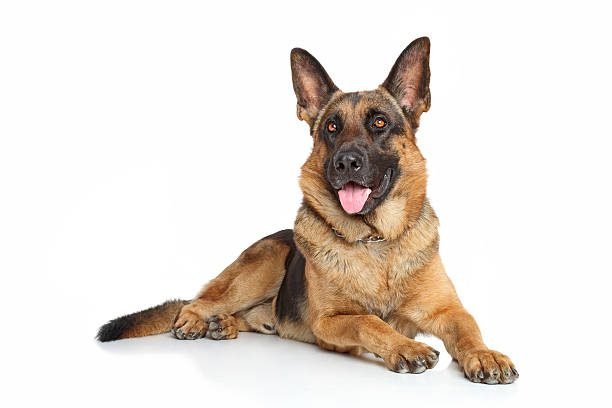In the tapestry of dog breeds, the German Shepherd stands as a testament to versatility, intelligence, and unwavering loyalty. Renowned for their keen work ethic, these dogs have carved a significant place in various roles, from police and military work to loving family companions. Join us on a journey to explore the history, physical attributes, temperament, and why German Shepherds consistently rank among the most admired and respected dog breeds.
A Glance into German Shepherd History
Originating in Germany in the late 19th century, German Shepherds were initially bred for their herding and guarding abilities. Captain Max von Stephanitz, credited as the breed’s founder, aimed to create a working dog with intelligence, strength, and a strong sense of duty. The result was the German Shepherd, a breed that excelled not only in herding but also in police and military work, search and rescue, and as devoted family protectors.
Overview of This German Shepherd Dog Breed
- Group
- Herding Group
- Origin
- Germany
- Size
- Large and powerful
- Height & Weight
- 22–26 inches tall; 65–90 pounds
- Temperament
- Loyal, intelligent, courageous, and confident
- Lifespan
- 9–13 years
- Exercise Needs
- High — requires daily physical and mental stimulation
- Trainability
- Excellent — quick learner and highly obedient
- Health Issues
- Hip and elbow dysplasia, degenerative myelopathy, bloat
- Best For
- Active families, experienced owners, working and service roles
- Summary
- The German Shepherd is a versatile and devoted breed, known for its intelligence, loyalty, and excellence in protection, police, and service work.
Identifying the German Shepherd: Physical Characteristics

German Shepherds exhibit distinctive features that contribute to their commanding presence:
- Size: They are a medium to large-sized breed, with males standing 24 to 26 inches at the shoulder, and females slightly smaller.
- Coat: German Shepherds have a dense double coat that comes in various colors, including black and tan, sable, and solid black. Their straight-backed appearance exudes strength and agility.
- Head and Ears: The breed showcases a noble head with a well-defined stop, and erect, pointed ears that convey attentiveness.
- Tail: German Shepherds typically have a bushy tail that hangs low when at rest and lifts when excited or alert.
Temperament: Intelligent, Obedient, and Protective
German Shepherds are celebrated for their admirable temperament and versatility:
- Intelligence: German Shepherds consistently rank among the most intelligent dog breeds. They are quick learners, making them highly trainable for various tasks and commands.
- Obedience: Known for their strong work ethic, German Shepherds are inherently obedient. They thrive on structured training and are eager to please their owners.
- Protectiveness: German Shepherds are naturally protective of their families. This protective instinct, combined with their courage, makes them excellent guard dogs.
Living Habits and Lifestyle
Understanding the living habits of German Shepherds ensures a harmonious environment:
- Exercise Needs: German Shepherds are an active breed that requires regular exercise to maintain physical and mental well-being. Daily walks, playtime, and engaging activities are essential.
- Socialization: Early socialization is crucial for German Shepherds to ensure they are comfortable around various people, pets, and situations. Proper socialization contributes to a well-mannered and balanced adult dog.
- Living Conditions: German Shepherds adapt well to various living conditions, including apartments, as long as they receive sufficient exercise and mental stimulation. However, access to a secure outdoor space is beneficial.
Nutrition and Health Considerations

Maintaining optimal health for German Shepherds involves careful attention to nutrition and preventive care:
- Balanced Diet: German Shepherds benefit from a balanced diet rich in quality proteins, healthy fats, and essential nutrients. Providing a diet appropriate for their life stage supports their overall health.
- Regular Veterinary Check-ups: Routine veterinary check-ups are crucial to monitor their health and address any potential issues promptly. German Shepherds may be prone to hip dysplasia and certain genetic conditions, so early detection and management are key.
Related Articles
Frequently Asked Questions (FAQs)
- Are German Shepherds good family pets?
- Yes, German Shepherds are known for their loyalty and protective nature, making them excellent family pets. Early socialization and proper training contribute to a well-behaved and affectionate companion.
- How much exercise do German Shepherds need daily?
- German Shepherds are an energetic breed that requires at least 60 to 90 minutes of exercise daily. Regular walks, playtime, and activities that engage their intelligence help maintain their physical and mental well-being.
- Do German Shepherds get along with other pets?
- With proper socialization from an early age, German Shepherds can get along well with other pets. However, their protective instincts may make them cautious, so introducing them to new animals should be done gradually and under supervision.
- Are German Shepherds good with children?
- Yes, German Shepherds can be excellent with children, especially if they are raised together. Their protective nature often makes them watchful over younger family members, and their intelligence allows them to form strong bonds with children.
- Do German Shepherds require a lot of grooming?
- German Shepherds have a double coat that sheds moderately. Regular brushing, at least a few times a week, helps manage shedding and keeps their coat healthy. Additional grooming needs include nail trimming, ear cleaning, and dental care.
Conclusion: The German Shepherd – A Noble Guardian
In conclusion, the German Shepherd dog breed stands as a noble guardian, embodying intelligence, loyalty, and a strong sense of duty. Whether working in vital roles such as police and military service or serving as a loving family companion, German Shepherds consistently showcase their adaptability and devotion. For those seeking a versatile and steadfast canine partner, the German Shepherd remains an iconic and cherished choice, leaving an indelible mark on the hearts of those fortunate enough to share their lives with these remarkable dogs.






